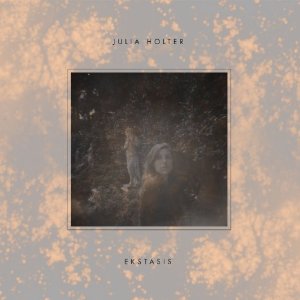In 2011, Julia Holter arrived seemingly armed with wisdom beyond her years. That wisdom translated into her first full-length, Tragedy. A masterful work based on Euripides’ Hippolytus, it was an album filled with the sort of vocal layering and echo chamber work that would make Meredith Monk or Alexis O’Hara proud.
The prolific Holter has returned already with Ekstasis (named after the Greek philosophical conception of a state of being outside of onself), her first for the RVNG label, and a more upbeat companion to Tragedy. For those worried that a sunnier record would deplete Holter’s quiver of its arrows, fear not: Ekstasis is actually a much more fully realised record, one that packs more mass appeal than Tragedy without sacrificing artistic integrity. Some songs, like ‘In The Same Room’, even have pop sensibilities to them. The infectious melody, steady beats, and alternately twinkling and swirling synthesisers add up to a song you could include on a mix for your less experimentally-minded friends.
But fear not – Ekstasis is not a pop album by any stretch of the imagination. There are still some songs more in the vein of the eight-minute ‘Boy In The Moon’, a cathartic improvisation setting Holter’s lulling vocal over a steady, spacey Casio SK-1. ‘Four Gardens’ is also an improvisation of sorts: the melody and lyrics were written as Holter experimented with a loop pedal to arrange an older song for a live performance. Beginning with whispers and evolving into a melodic refrain of "Will you come go, will you come go with me?," it maximises the negative space between clicks, loops, and vocals, and even a surprising saxophone at the song’s end.
Spontaneous or not, the album is tight and succeeds in its aims, largely because of Holter’s impressive vocal capabilities and ability to maximise even the most minimal backing music. Her voice ranges from the dreamily gothic, evocative of Faith & Disease, through whispers, to to an affected, Laurie Anderson-like style. This variety is clear from the start — the opening track, ‘Marienbad’ (probably based on the film Last Year At Marienbad) is a lush concoction of Fender Rhodes, the sounds of breath, and Holter’s voice layered at all sorts of impressive ranges. The lyrics are intriguing too, as she intones "So bored in mammalian skin!… Over stone so still, like birds so stoically by the drain/Gardens carved of stone/The human whispers, so cold/A fountain ices over/A story over".
Holter even makes a concession to continuity here, featuring a song entitled ‘Goddess Eyes II’, a sequel to Tragedy‘s ‘Goddess Eyes’. It doesn’t deviate much from the original, Holter singing "I can see you, but my eyes are not allowed to cry" with the same mannered vocals, but as a standalone song it works well and doesn’t seem out of place. ‘Our Sorrows’, the second track on Ekstasis, has a similarly affected and echoed style, though its melody is harder to follow than on other songs here.
Things come to a close with the nine minute ‘This Is Ekstasis’. "This is not the quietness, this is the ekstasis/This is not ekstasis, this is the quietness," it affirms, rather ambivalently. Still, Holter can confirm or deny it all she wants – Ekstasis is ecstatically good.


